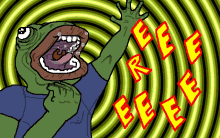CalebZhass
Really Experienced
- Joined
- Dec 30, 2023
- Posts
- 193
Trigger warning:
Plea:
So, with those two out of the way, the premise is really simple. We have a technology which eventually - within the foreseeable future - is going to dominate our everyday lives. It already has some profound impact on literature and graphical artistry, but that impact is likely going to become much more significant as the technology progresses.
The main question is. What do we stand to lose.
- On the very short term, with AI technology being like this, as it gets wider acceptance?
- On the longer term, when AI gets to the point, that it can mimic our creativity and work perfectly or even surpass it?
What do we stand to gain? If anything.
On a more philosophical level: what do we even bring to the table, as humans, when it comes to art?
When you read a piece of art, does it matter how much effort went into it? Do you enjoy something more, knowing that someone struggled for endless nights to find the right expression as opposed to the work of the person who just asked around to get ideas from their writer friends? (or AI buddies - as sad as that might sound)
Finally, what are your hopes for our future with regards to AI in art? How do you see AI in your future life, if it's in it at all?
To kick it off, here are my answers to those questions:
- On the short term, I believe it's mostly sleep we will lose, as the controversies surrounding the unregulated, irresponsible and/or unmitigated use of AI will create all sorts of problems for people. What we see on Lit or how others struggle to find their own footing in this new landscape are prime examples of this.
- We will also see industries turned upside down, Neo-Luddite movements cropping up, fighting against the inevitable.
- On the long term, the main loss I believe will be our ability of being surprised by art. An AI artist can give you exactly what you want, always and future AI will be able to give you what you want perfectly. Sure, you will be able to ask it to surprise you, but the thrill of discovering something will be gone. You will just be handed random things that you either like or do not like, but you will not have the active action of 'looking for it' that gets rewarded when you finally find it. Other than that, when it comes to the actual mechanical form of the art in question, I believe AI art and human art will become interchangeable sooner than most of us would like.
- We might also lose the sense of need, without which there really can be no sense of fulfillment. If I can just ask the AI to give me anything I want any time I want, then I will never need anything. All my needs have been met.
- As for gains, I think it's obvious. If you think of something, you can just have the AI make it for you. Want to have a fancy decoration, just have the AI design it and 3D print it out for you. Want to have a particularly themed song? Just ask for it. Illustration for something? Just ask for it. In a sense, it is the consumerism utopia, especially since these AIs would likely be in the hands of a few big companies due to their sheer size and the technological requirements to run them.
- on the philosophical level, I don't believe in the soul. I think that everything in the universe can be reproduced as long as we can map its composition properly and have the means of reproducing that composition. In the age of quantum computing and neural networks, that we will eventually make a computer brain that can think and feel just like us is inevitable. I think we will soon possess the capacity to create machines that can surpass us in every possible mental characteristic and this scares the hell out of me, as I do not consider our species grown up enough to start playing God and create intelligent, thinking beings. Then again, we were never good when it came to restraining ourselves to the sensible, so as I wrote above, I find that this is inevitable and might also happen a lot sooner than we would like, if it has not happened already.
This thread might contain discussions of "AI" and its future on creative arts. If you are absolutely infuriated by the concept of "AI" or how it related to lit, please just stop reading here. I respect your stance and even though I would love to hear your perspective, I believe your health and happiness more important than indulging my curiosity. No, I am not trying to organize a secret cabal here to overthrow the rules, I am just genuinely interested in a discussion about some of the things I saw mentioned.
Plea:
This is a sensitive topic, let's be mindful of each other's feelings in all directions. If you feel someone steps on yours, assume it was a mistake and try not to jerk your knee in response, but if possible let's all avoid stepping on each other's toes. If any mod feels this thread is a bad idea, please feel free to close it down.
So, with those two out of the way, the premise is really simple. We have a technology which eventually - within the foreseeable future - is going to dominate our everyday lives. It already has some profound impact on literature and graphical artistry, but that impact is likely going to become much more significant as the technology progresses.
The main question is. What do we stand to lose.
- On the very short term, with AI technology being like this, as it gets wider acceptance?
- On the longer term, when AI gets to the point, that it can mimic our creativity and work perfectly or even surpass it?
What do we stand to gain? If anything.
On a more philosophical level: what do we even bring to the table, as humans, when it comes to art?
When you read a piece of art, does it matter how much effort went into it? Do you enjoy something more, knowing that someone struggled for endless nights to find the right expression as opposed to the work of the person who just asked around to get ideas from their writer friends? (or AI buddies - as sad as that might sound)
Finally, what are your hopes for our future with regards to AI in art? How do you see AI in your future life, if it's in it at all?
To kick it off, here are my answers to those questions:
- On the short term, I believe it's mostly sleep we will lose, as the controversies surrounding the unregulated, irresponsible and/or unmitigated use of AI will create all sorts of problems for people. What we see on Lit or how others struggle to find their own footing in this new landscape are prime examples of this.
- We will also see industries turned upside down, Neo-Luddite movements cropping up, fighting against the inevitable.
- On the long term, the main loss I believe will be our ability of being surprised by art. An AI artist can give you exactly what you want, always and future AI will be able to give you what you want perfectly. Sure, you will be able to ask it to surprise you, but the thrill of discovering something will be gone. You will just be handed random things that you either like or do not like, but you will not have the active action of 'looking for it' that gets rewarded when you finally find it. Other than that, when it comes to the actual mechanical form of the art in question, I believe AI art and human art will become interchangeable sooner than most of us would like.
- We might also lose the sense of need, without which there really can be no sense of fulfillment. If I can just ask the AI to give me anything I want any time I want, then I will never need anything. All my needs have been met.
- As for gains, I think it's obvious. If you think of something, you can just have the AI make it for you. Want to have a fancy decoration, just have the AI design it and 3D print it out for you. Want to have a particularly themed song? Just ask for it. Illustration for something? Just ask for it. In a sense, it is the consumerism utopia, especially since these AIs would likely be in the hands of a few big companies due to their sheer size and the technological requirements to run them.
- on the philosophical level, I don't believe in the soul. I think that everything in the universe can be reproduced as long as we can map its composition properly and have the means of reproducing that composition. In the age of quantum computing and neural networks, that we will eventually make a computer brain that can think and feel just like us is inevitable. I think we will soon possess the capacity to create machines that can surpass us in every possible mental characteristic and this scares the hell out of me, as I do not consider our species grown up enough to start playing God and create intelligent, thinking beings. Then again, we were never good when it came to restraining ourselves to the sensible, so as I wrote above, I find that this is inevitable and might also happen a lot sooner than we would like, if it has not happened already.



